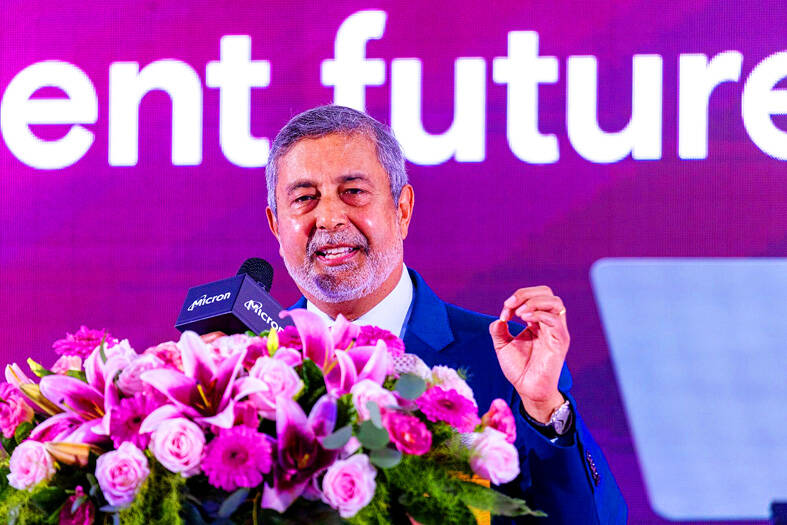Micron Technology Inc, the world’s third-largest memorychip maker, yesterday launched a new advanced chip assembly and testing plant in Taichung, paving the way for volume production of its high-bandwidth-memory HBM3E chips early next year to satisfy growing demand for artificial intelligence (AI) devices.
The Boise, Idaho-based company said the new facility, dubbed Advanced Assembly and Test Taiwan (AATT), integrates advanced probe, 3D packaging and testing capabilities to enable production of HBM3E and other products used in AI devices, data centers, and edge computing and cloud applications.
The new facility currently assembles and tests Micron’s one-beta DRAM manufactured at its Japanese fab in Hiroshima, the company said.

Photo: Bloomberg
Micron said it is seeing strong interest and enthusiasm for the HBM3E chips, which enable faster AI algorithms by providing “higher memory capacity that improves performance and reduces CPU offload for faster training and more responsive queries.”
AI applications provide a tremendous opportunity for new efficiency and transformation experiences, Micron Technology president and CEO Sanjay Mehrotra said at the opening ceremony for the AATT facility in Taichung. The company has unveiled products that unleash the power of AI from cloud to edge applications, he said.
Taiwan is the only manufacturing location that has vertical integration — from silicon manufacturing, assembly and testing to logistics — across Micron’s facilities, the company said.
“The opening of our new Advanced Assembly and Test facility is a reflection of Micron’s technology leadership, operational excellence and deep, long-term commitment to meeting the needs of our global customer base,” Mehrotra said.
“We are dedicated to Taiwan’s growth, and our investment in local operations will create hundreds of new Micron jobs, and thousands more for the surrounding community over the next ten years, allowing us to help create a lasting positive social impact,” he said.
Micron also operates assembly and test facilities in China, Malaysia and Singapore, the company said.
The opening of the new facility proves that Micron has recognized Taiwan as a reliable and secure investment destination, President Tsai Ing-wen (蔡英文) said at the opening ceremony yesterday.
Working with reliable partners and securing a resilient supply chain are now more important than ever, as no country and no industry can avoid the impacts of the COVID-19 pandemic and Russia’s invasion of Ukraine, Tsai said.
Micron yesterday also reiterated that it is on schedule to ramp up production of its next-generation one-gamma chips, which would enter volume production in the first half of 2025 at its A3 fab in Taichung. Micron Taiwan installed extreme ultraviolet lithography (EUV) tools, a key equipment to manufacture one-gamma chips, last year, before Micron Japan did so.
The company will explore the feasibility of arranging new job recruitments when its factories return to full utilization, said Donghui Lu (盧東暉), corporate vice president of front-end manufacturing and head of Micron Taiwan. Micron has suspended global headcount cuts, he said.
Micron said last week that prices of memory chips have bottomed and are expected to rebound next year.

Intel Corp chief executive officer Lip-Bu Tan (陳立武) is expected to meet with Taiwanese suppliers next month in conjunction with the opening of the Computex Taipei trade show, supply chain sources said on Monday. The visit, the first for Tan to Taiwan since assuming his new post last month, would be aimed at enhancing Intel’s ties with suppliers in Taiwan as he attempts to help turn around the struggling US chipmaker, the sources said. Tan is to hold a banquet to celebrate Intel’s 40-year presence in Taiwan before Computex opens on May 20 and invite dozens of Taiwanese suppliers to exchange views

Application-specific integrated circuit designer Faraday Technology Corp (智原) yesterday said that although revenue this quarter would decline 30 percent from last quarter, it retained its full-year forecast of revenue growth of 100 percent. The company attributed the quarterly drop to a slowdown in customers’ production of chips using Faraday’s advanced packaging technology. The company is still confident about its revenue growth this year, given its strong “design-win” — or the projects it won to help customers design their chips, Faraday president Steve Wang (王國雍) told an online earnings conference. “The design-win this year is better than we expected. We believe we will win

Chizuko Kimura has become the first female sushi chef in the world to win a Michelin star, fulfilling a promise she made to her dying husband to continue his legacy. The 54-year-old Japanese chef regained the Michelin star her late husband, Shunei Kimura, won three years ago for their Sushi Shunei restaurant in Paris. For Shunei Kimura, the star was a dream come true. However, the joy was short-lived. He died from cancer just three months later in June 2022. He was 65. The following year, the restaurant in the heart of Montmartre lost its star rating. Chizuko Kimura insisted that the new star is still down

While China’s leaders use their economic and political might to fight US President Donald Trump’s trade war “to the end,” its army of social media soldiers are embarking on a more humorous campaign online. Trump’s tariff blitz has seen Washington and Beijing impose eye-watering duties on imports from the other, fanning a standoff between the economic superpowers that has sparked global recession fears and sent markets into a tailspin. Trump says his policy is a response to years of being “ripped off” by other countries and aims to bring manufacturing to the US, forcing companies to employ US workers. However, China’s online warriors